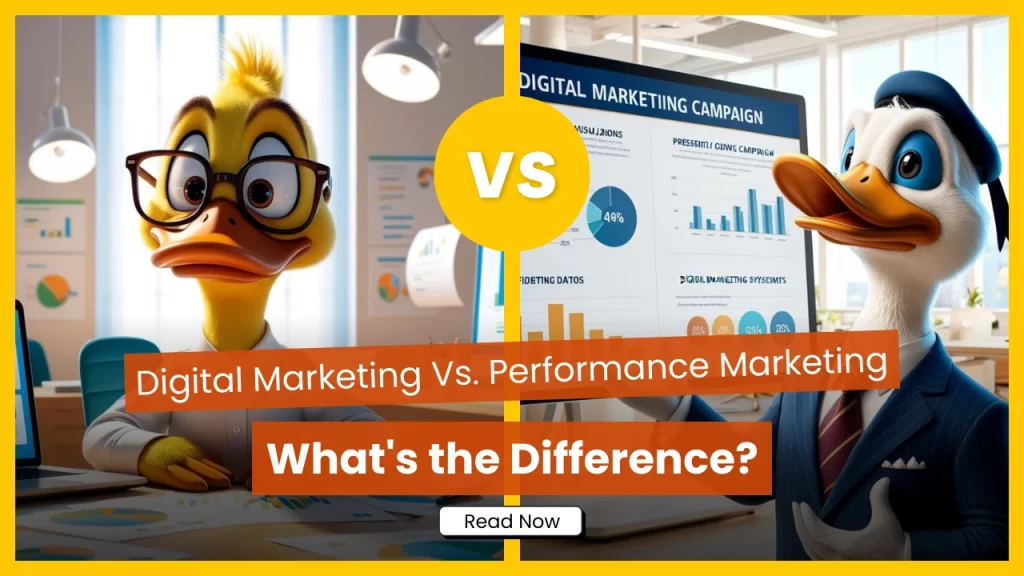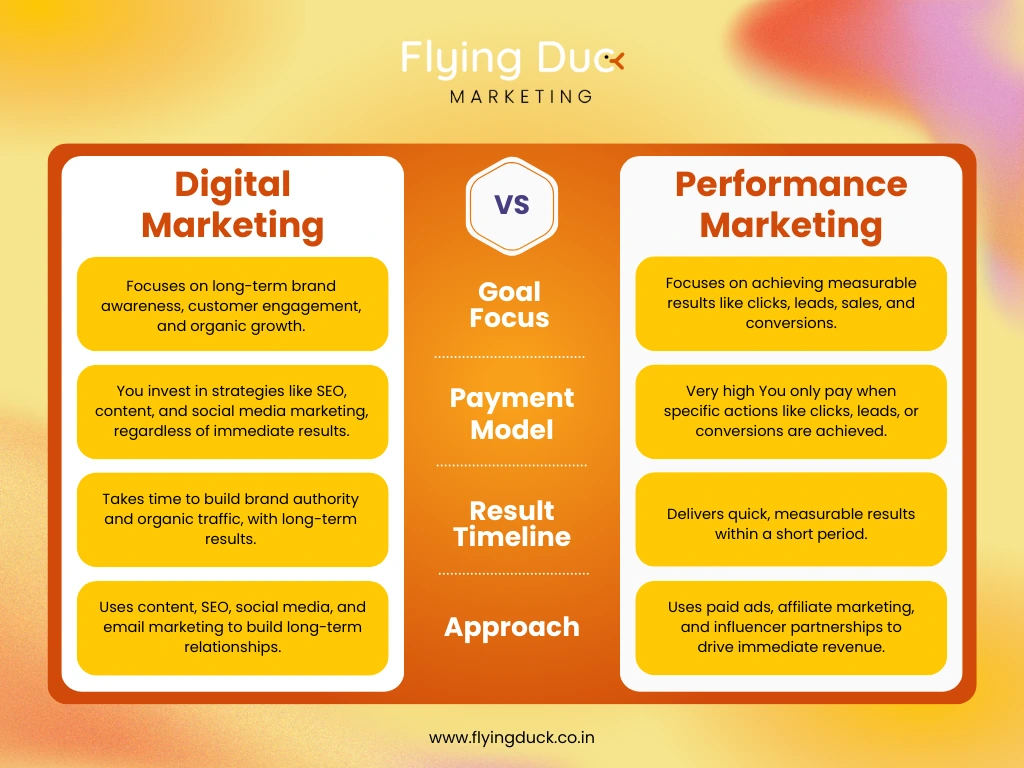Digital Marketing Vs Performance Marketing: What’s the Difference?

Almost every other business looks forward to “online marketing,” but they often confuse digital marketing and performance marketing. While both aim to boost brand visibility and revenue, their approaches, goals, and metrics differ significantly.
Hence, many struggle with choosing the right strategy, leading to wasted budgets and missed growth opportunities. This guide will break down the key differences and help you decide which approach is best for your business.
Difference between Digital Marketing and Performance Marketing in a Nutshell
Both digital marketing and performance marketing are equally essential for a business’s growth, but they significantly differ from each other. Here’s how:
| Aspect | Digital Marketing | Performance Marketing |
| Definition | Long-term online marketing strategy to promote brands | Short-term goal-focused online marketing strategy |
| Objective | Increase brand awareness, engagement, traffic, and leads | Focuses on bringing measurable results like sales, leads, and conversions |
| Payment model | Should pay for various strategies, including content marketing, email marketing, SEO, and more | Pay only for specific actions like clicks, leads, signups, etc. |
| Focus | Long-term branding, community building, and engagement | Short-term, data-driven results |
| Key channels | SEO, social media, email, content, paid ads. | Paid ads, affiliates, influencer (performance-based), retargeting. |
| Metrics | Impressions, traffic, engagement | Clicks, leads, Acquisition |
| Best for | Businesses looking to build brand awareness, and long-term engagement and want organic growth (SEO, content, social media). | Businesses focused on sales and lead generation, and want immediate conversions without wasting ad spend. |
What is Digital Marketing?
Digital marketing is an online marketing strategy designed to generate leads, drive traffic, and increase brand awareness. It is a broad umbrella that includes social media, email, content, and performance marketing.
Digital marketing strategies use the internet and online platforms to connect with potential customers. These platforms include social media, pay-per-click (PPC), search engine optimization (SEO), and email marketing. From attracting new customers to engaging existing ones, digital marketing helps build a strong brand, enhance customer experience, and increase conversions.
Different Methods of Digital Marketing
To effectively reach and engage customers, digital marketing includes multiple strategies. Below are the most effective online marketing methods used today:
- Search engine optimization
- Content marketing
- Social media marketing
- Performance marketing
- Mobile marketing
Key Responsibilities of a Digital Marketer
Digital marketing isn’t a one-person job. It requires a dedicated team or agency to execute it effectively. When you hire a marketing team, here are the key areas they handle:
- Developing and executing marketing strategies.
- Optimizing websites for SEO and user experience.
- Creating and distributing engaging content.
- Managing social media marketing and audience engagement.
- Running paid advertising campaigns (PPC, social media ads).
- Implementing email marketing and lead nurturing strategies.
- Analyzing data to track performance and improve results.
- Staying updated with industry trends and algorithm changes and more
What is Performance Marketing?
Performance marketing is a marketing strategy that uses data collected and analyzed through digital marketing methods to execute highly targeted, results-driven campaigns where advertisers pay based on specific outcomes like clicks, leads, or sales.
Performance marketing is a short-term, goal-focused marketing strategy. This makes it the first choice for businesses, as it delivers immediate results and minimizes the risk of budget waste. However, many people think performance marketing means you only pay when you get results like leads, clicks, or sales. But in reality, success takes time and the right strategy.
To get real results, businesses need to analyze past campaigns and understand their audience. While performance marketing offers faster ROI tracking, it still requires an initial investment, just like digital marketing. The key advantage is that performance marketing allows businesses to quickly adjust campaigns, cut unnecessary costs, and improve returns.
Different Methods of Performance Marketing
Similar to digital marketing, performance marketing is not limited to running ad campaigns. Here are different methods of performance marketing:
- Pay-Per-Click (PPC) Advertising
- Affiliate Marketing
- Influencer Marketing
- Social Media Advertising
- Native Advertising
- Retargeting/Remarketing
- Cost-Per-Acquisition (CPA) & Cost-Per-Lead (CPL) Campaigns
Key Responsibilities of a Performance Marketer
Performance marketing can be done by a person or a team, depending on brand requirements and marketers’ expertise. However, the responsibilities often stay the same. So, when you hire a performance marketer, here are the key areas they handle:
- Planning and executing data-driven marketing campaigns.
- Managing PPC, social media, and affiliate marketing strategies.
- Optimizing ad creatives, audience targeting, and bidding strategies.
- Tracking key metrics like CPA, ROAS, and conversion rates.
- Running A/B tests to improve campaign performance.
- Managing budgets and ensuring high ROI on ad spend.
- Implementing retargeting strategies to recover lost leads.
- Staying updated with ad platform trends, algorithms, and best practices.
Digital Marketing Vs. Performance Marketing
Both digital and performance marketing serve distinct purposes, and the right choice depends on your business model, goals, and industry. Understanding which approach aligns with your needs can help optimize your marketing investments.
Digital marketing is best for businesses focused on long-term brand building, audience engagement, and organic growth. This includes B2B companies, startups, small businesses, and service-based businesses.
On the other hand, performance marketing is ideal for businesses that need measurable, fast, and scalable results. Industries like subscription-based services, event & ticketing platforms, and e-commerce benefit the most from this approach.

Conclusion: Which One is Right for Your Business?
Digital marketing is a long-term strategy that connects brands with their audience using online platforms. It requires time and budget but offers long-term success. On the other hand, performance marketing is a short-term marketing strategy that uses online platforms to bring measurable and quick results like clicks, leads, sign-ups, etc.
As a marketing agency, we believe the most effective approach is a blend of digital and performance marketing. Digital marketing builds brand trust, engages audiences, and gathers valuable insights, while performance marketing drives immediate, measurable results. By using digital marketing insights to refine performance strategies, businesses can maximize ROI, accelerate organic growth, and achieve long-term success.
FAQ
- How long does it take to see results from digital marketing?
A: Digital marketing is a long-term strategy focused on brand awareness, audience engagement, and organic growth. SEO and content marketing may take 3 to 6 months to show results, while paid advertising and social media marketing can drive quicker engagement. However, consistent efforts help build strong brand authority and long-term customer loyalty.
- Can we do performance marketing without digital marketing?
A: Digital marketing lays the foundation for performance marketing. It provides the essential data, audience insights, and brand awareness needed for effective performance marketing. Without a strong digital foundation, performance marketing campaigns may struggle with accurate targeting, brand positioning, and long-term growth, leading to wasted ad spend and lower ROI.
